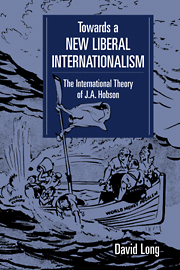Book contents
- Frontmatter
- Contents
- Acknowledgements
- 1 Introduction
- 2 Rationality, welfare and the organic analogy
- 3 Co-operation, the surplus and the theory of underconsumption
- 4 An evolutionary framework for international relations
- 5 The domestic determinants of an imperialistic foreign policy
- 6 The international relations of imperialism
- 7 Economic internationalism, free trade and international government
- 8 International government and the maintenance of peace
- 9 J. A. Hobson and liberal internationalism
- Notes
- Bibliography
- Index
- LSE MONOGRAPHS IN INTERNATIONAL STUDIES
5 - The domestic determinants of an imperialistic foreign policy
Published online by Cambridge University Press: 12 September 2009
- Frontmatter
- Contents
- Acknowledgements
- 1 Introduction
- 2 Rationality, welfare and the organic analogy
- 3 Co-operation, the surplus and the theory of underconsumption
- 4 An evolutionary framework for international relations
- 5 The domestic determinants of an imperialistic foreign policy
- 6 The international relations of imperialism
- 7 Economic internationalism, free trade and international government
- 8 International government and the maintenance of peace
- 9 J. A. Hobson and liberal internationalism
- Notes
- Bibliography
- Index
- LSE MONOGRAPHS IN INTERNATIONAL STUDIES
Summary
Imperialism is the most famous part of Hobson's work, a classic in the field of international relations and the basis of his reputation as a social theorist. His theory of imperialism influenced Marxist and neo-Marxist theories of imperialism from Lenin onwards. This chapter examines Hobson's analysis of the forces behind imperialism as a foreign policy of developed states. It counters a prevalent misreading of Hobson that he attempted to provide a scientific theory of imperialism and that he viewed the forces behind imperialism as solely economic. Hobson's critique of imperialism was a political statement, not the statement of scientific theory. Hobson intended to unmask the ideology of imperial necessity and, in doing so, transform the liberal discussion of international relations. In the next chapter I turn to the international aspects of Hobson's theory of imperialism and counter the proposition prevalent among scholars of international relations that these are reducible to his account of its domestic causes.
This chapter demonstrates that Hobson's theory of imperialism is more sophisticated, ambiguous and contradictory than is frequently given credit in the international relations literature. It first deals with Hobson's understanding of the meaning of the word ‘imperialism’. He used one basic meaning of imperialism and elaborated upon it in his discussion of the ‘new imperialism’.
- Type
- Chapter
- Information
- Towards a New Liberal InternationalismThe International Theory of J. A. Hobson, pp. 72 - 96Publisher: Cambridge University PressPrint publication year: 1995

